Education and morality-英语作文写作范文
关于教育理念的作文英语

关于教育理念的作文英语Title: Reimagining Education: A Journey towardsHolistic Development。
Education is not merely the imparting of knowledge; itis the cultivation of minds, the nurturing of souls, andthe shaping of character. In today's rapidly changing world, the role of education transcends traditional boundaries, embracing innovation, creativity, and adaptability. As we embark on this journey of reimagining education, it is imperative to delve into diverse perspectives, amalgamating the wisdom of the past with the aspirations of the future.At the heart of reimagining education lies the recognition of individuality. Every student is unique, with distinct strengths, passions, and aspirations. Therefore, education should be tailored to cater to the diverse needsof learners, fostering an inclusive environment where every voice is heard, and every talent is nurtured. Gone are the days of one-size-fits-all education; instead, personalizedlearning experiences empower students to unleash their full potential, driving them towards excellence.Central to this paradigm shift is the cultivation of critical thinking and problem-solving skills. In an age inundated with information, the ability to discern, analyze, and synthesize knowledge is paramount. Education should equip students with the tools to navigate complexities, challenge conventional wisdom, and innovate solutions toreal-world problems. By fostering a culture of inquiry and exploration, we empower learners to become lifelong learners, equipped to thrive in an ever-evolving landscape.Moreover, reimagining education necessitates a holistic approach that transcends academic excellence. While academic proficiency is essential, it is equally vital to nurture emotional intelligence, empathy, and resilience. Social and emotional learning should be integrated into the curriculum, fostering empathy, cooperation, and conflict resolution skills. By nurturing the holistic development of students, education becomes a transformative journey that empowers individuals to lead fulfilling lives andcontribute meaningfully to society.Furthermore, reimagining education extends beyond the confines of the classroom, embracing experiential learning and community engagement. Field trips, internships, and service-learning projects provide opportunities forstudents to apply theoretical knowledge in real-world contexts, fostering a deeper understanding of the world around them. By forging partnerships with local communities and businesses, education becomes a collaborative endeavor that bridges the gap between theory and practice, preparing students for the complexities of the globalized world.In addition to fostering academic and personal growth, reimagining education also entails cultivating global citizenship and sustainability. In an interconnected world, students must develop a global perspective, understanding and appreciating diverse cultures, perspectives, and values. Education should foster a sense of responsibility towards the planet, nurturing environmental stewardship and sustainable practices. By instilling a sense of global awareness and ethical responsibility, education becomes acatalyst for positive change, empowering students to address global challenges and create a more just and sustainable world.In conclusion, reimagining education is a journey of innovation, inclusion, and empowerment. By embracing diversity, fostering critical thinking, nurturing holistic development, and promoting global citizenship, education becomes a transformative force that empowers individuals to realize their full potential and contribute meaningfully to society. As we embark on this journey, let us envision an education system that transcends boundaries, ignites curiosity, and inspires a lifelong love for learning. Together, let us create a future where education is notjust a means to an end but a journey of discovery, growth, and fulfillment.。
倡导德智体美劳五育教育的英语作文

倡导德智体美劳五育教育的英语作文Advocating comprehensive education in morality, intelligence, physicality, aesthetics, and labor is crucial in shaping well-rounded individuals. This type of education, known as the "five development goals" in Chinese education, emphasizes the holistic development of students and aims to cultivate their diverse potentials.Morality education plays a fundamental role in fostering good character traits and ethical values in students. It teaches them the importance of honesty, integrity, respect, and compassion. By instilling moral principles in students, we can guide them to make responsible decisions and develop positive relationships with others. This in turn contributes to creating a harmonious and caring society.Intelligence education focuses on developing students' cognitive abilities, critical thinking skills, and problem-solving capabilities. It encourages students to actively engage in the learning process, think independently, and acquire knowledge through inquiry and exploration. By nurturing their intellectual curiosity and creativity, we can empower students to adapt to a rapidly changing world and become lifelong learners.Physical education is essential for promoting students' physical health, fitness, and well-being. It encourages them to adopt healthy lifestyles, participate in regular exercise, and develop strong bodies. Physical activities not only improve students' physical health but also enhance their mental and emotional well-being. By engaging in sports and physical exercises, students can build confidence, teamwork skills, and resilience.Aesthetic education focuses on cultivating students' appreciation for art, music, literature, and other forms of beauty. It encourages them to develop their artistic talents, creativity, and imagination. By exposing students to different forms of aesthetic expression, we can broaden their horizons, stimulate their senses, and deepen their emotional experiences. Aesthetic education fosters students' aesthetic sensibility and helps them develop an appreciation for the beauty of the world around them.Labor education emphasizes the value of hard work, perseverance, and practical skills. It teaches students the importance of being industrious, self-reliant, and resourceful. By engaging in hands-on activities and vocational training, students can develop practical skills, work ethic, and entrepreneurial spirit.Labor education prepares students for the challenges of the workforce and equips them with the skills needed to succeed in their chosen careers.In conclusion, advocating comprehensive education in morality, intelligence, physicality, aesthetics, and labor is essential for nurturing well-rounded individuals. By embracing the principles of the five development goals, we can create a more inclusive, balanced, and harmonious educational environment that empowers students to realize their full potential and contribute positively to society. Let us continue to support and promote the holistic development of students through the five-pillar approach to education.。
Educationandmorality教育与道德-英语作文
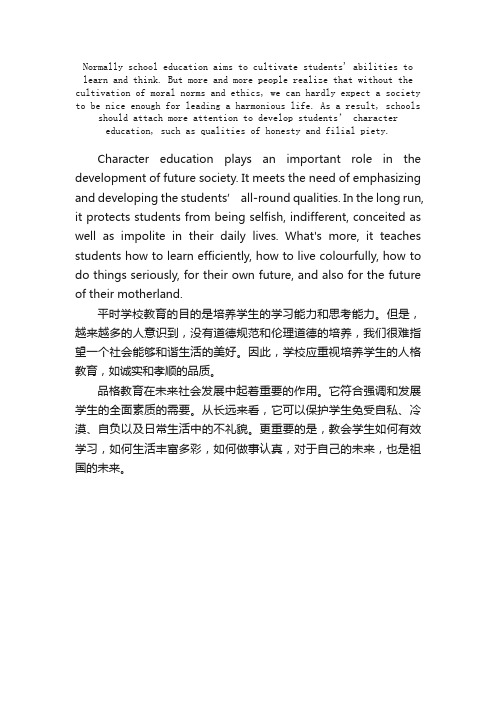
Normally school education aims to cultivate students' abilities to learn and think. But more and more people realize that without the cultivation of moral norms and ethics, we can hardly expect a society to be nice enough for leading a harmonious life. As a result, schools should attach more attention to develop students’ charactereducation, such as qualities of honesty and filial piety.Character education plays an important role in the development of future society. It meets the need of emphasizing and d eveloping the students’ all-round qualities. In the long run, it protects students from being selfish, indifferent, conceited as well as impolite in their daily lives. What's more, it teaches students how to learn efficiently, how to live colourfully, how to do things seriously, for their own future, and also for the future of their motherland.平时学校教育的目的是培养学生的学习能力和思考能力。
Education and morality 教育与道德-英语写作范文
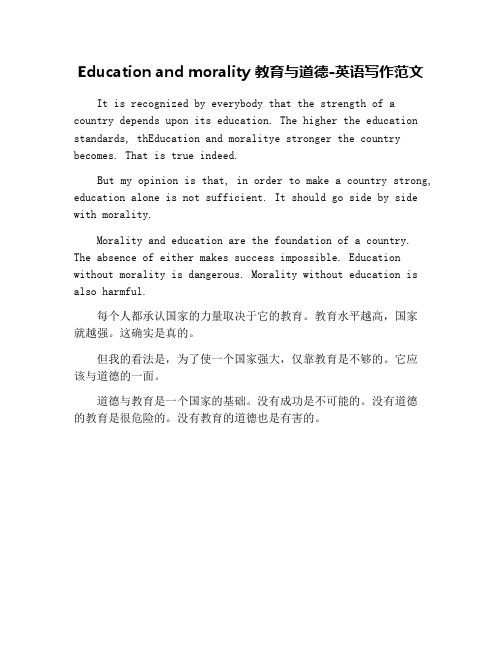
Education and morality 教育与道德-英语写作范文
It is recognized by everybody that the strength of a country depends upon its education. The higher the education standards, thEducation and moralitye stronger the country becomes. That is true indeed.
But my opinion is that, in order to make a country strong, education alone is not sufficient. It should go side by side with morality.
Morality and education are the foundation of a country. The absence of either makes success impossible. Education without morality is dangerous. Morality without education is also harmful.
每个人都承认国家的力量取决于它的教育。
教育水平越高,国家
就越强。
这确实是真的。
但我的看法是,为了使一个国家强大,仅靠教育是不够的。
它应
该与道德的一面。
道德与教育是一个国家的基础。
没有成功是不可能的。
没有道德
的教育是很危险的。
没有教育的道德也是有害的。
伦理道德英语作文范文
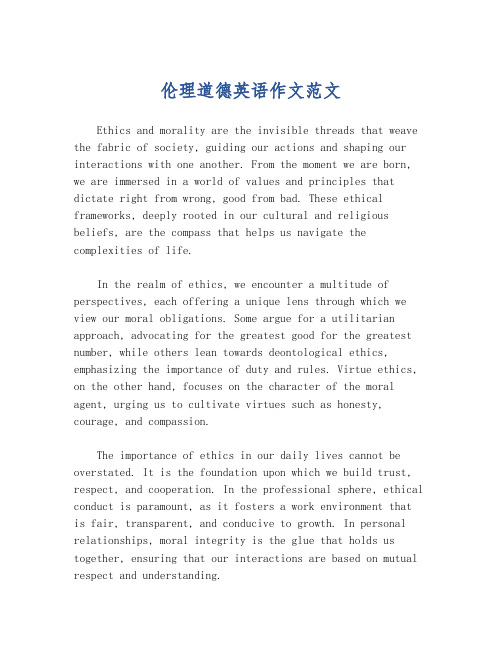
伦理道德英语作文范文Ethics and morality are the invisible threads that weave the fabric of society, guiding our actions and shaping our interactions with one another. From the moment we are born, we are immersed in a world of values and principles that dictate right from wrong, good from bad. These ethical frameworks, deeply rooted in our cultural and religious beliefs, are the compass that helps us navigate the complexities of life.In the realm of ethics, we encounter a multitude of perspectives, each offering a unique lens through which we view our moral obligations. Some argue for a utilitarian approach, advocating for the greatest good for the greatest number, while others lean towards deontological ethics, emphasizing the importance of duty and rules. Virtue ethics, on the other hand, focuses on the character of the moral agent, urging us to cultivate virtues such as honesty, courage, and compassion.The importance of ethics in our daily lives cannot be overstated. It is the foundation upon which we build trust, respect, and cooperation. In the professional sphere, ethical conduct is paramount, as it fosters a work environment that is fair, transparent, and conducive to growth. In personal relationships, moral integrity is the glue that holds us together, ensuring that our interactions are based on mutual respect and understanding.However, the complexities of the modern world often present us with ethical dilemmas that challenge our preconceived notions of right and wrong. Issues such as privacy, data security, and environmental sustainability require us to constantly reevaluate our moral stances and adapt our ethical frameworks to new challenges.Education plays a crucial role in shaping our ethical understanding. By teaching the principles of ethics and encouraging critical thinking, we can equip the next generation with the tools to make informed moral decisions. It is through education that we can instill a sense of responsibility and a commitment to upholding the values that define our society.In conclusion, ethics and morality are not static concepts but dynamic forces that evolve with time and experience. As we continue to grapple with the moral challenges of our era, it is imperative that we engage in open dialogue, foster a culture of ethical awareness, and strive to make the world a better place for all.。
有关道德和美德的英语作文必修三
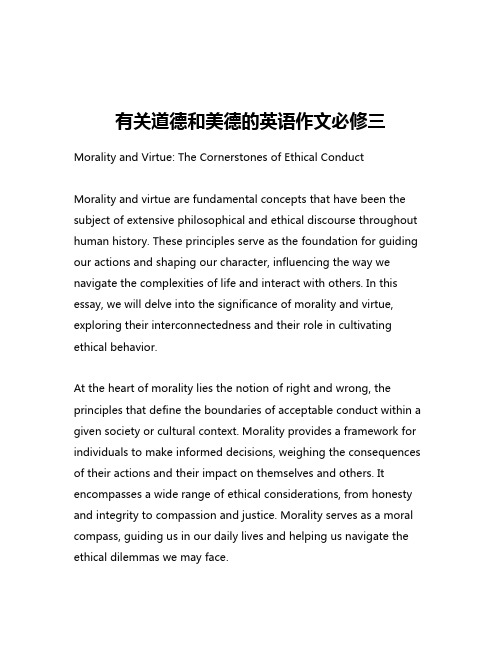
有关道德和美德的英语作文必修三Morality and Virtue: The Cornerstones of Ethical ConductMorality and virtue are fundamental concepts that have been the subject of extensive philosophical and ethical discourse throughout human history. These principles serve as the foundation for guiding our actions and shaping our character, influencing the way we navigate the complexities of life and interact with others. In this essay, we will delve into the significance of morality and virtue, exploring their interconnectedness and their role in cultivating ethical behavior.At the heart of morality lies the notion of right and wrong, the principles that define the boundaries of acceptable conduct within a given society or cultural context. Morality provides a framework for individuals to make informed decisions, weighing the consequences of their actions and their impact on themselves and others. It encompasses a wide range of ethical considerations, from honesty and integrity to compassion and justice. Morality serves as a moral compass, guiding us in our daily lives and helping us navigate the ethical dilemmas we may face.Virtue, on the other hand, refers to the positive character traits and moral excellence that individuals strive to cultivate within themselves. Virtues such as courage, temperance, wisdom, and justice have been revered throughout history as hallmarks of moral character. These virtues are not merely abstract concepts but rather tangible qualities that shape our behavior and interactions with others. When we embody and exemplify these virtues, we demonstrate a commitment to ethical conduct and a desire to contribute positively to our communities.The relationship between morality and virtue is symbiotic and interdependent. Morality provides the ethical principles that guide our actions, while virtue represents the personal qualities and habits that enable us to uphold those principles. Individuals who possess a strong sense of morality are more likely to develop and exhibit virtuous traits, as they strive to align their actions with their ethical beliefs. Conversely, the cultivation of virtue can deepen our understanding and internalization of moral principles, leading to more consistent and principled behavior.One of the primary functions of morality and virtue is to foster social cohesion and collective well-being. When individuals within a society adhere to shared moral standards and cultivate virtuous traits, they are more likely to engage in cooperative and mutually beneficial interactions. This, in turn, contributes to the creation of a harmoniousand stable social fabric, where trust, respect, and reciprocity become the foundation for interpersonal relationships.Moreover, the importance of morality and virtue extends beyond the individual level, as they play a crucial role in shaping the ethical foundations of institutions, organizations, and systems. Leaders and decision-makers who embrace moral and virtuous principles are more likely to make choices that prioritize the common good over narrow self-interest. This, in turn, can lead to the development of policies, laws, and structures that promote the well-being of all members of society, rather than catering to the privileged few.However, the cultivation of morality and virtue is not without its challenges. In today's complex and rapidly changing world, individuals are often confronted with ethical dilemmas that test the limits of their moral compass. The temptation to prioritize personal gain over the greater good, the influence of societal pressures and biases, and the ambiguity of certain ethical situations can all pose obstacles to the consistent application of moral and virtuous principles.To overcome these challenges, it is essential to cultivate a deep understanding and internalization of moral and virtuous principles. This can be achieved through education, self-reflection, and the development of practical wisdom. By engaging in ongoing dialogueand critical analysis of ethical issues, individuals can strengthen their ability to make informed and principled decisions, even in the face of difficult circumstances.Additionally, the cultivation of morality and virtue requires a commitment to lifelong learning and personal growth. As our understanding of ethical concepts evolves and the complexities of the world change, we must be willing to adapt and refine our moral and virtuous practices. This may involve challenging our own biases, seeking out diverse perspectives, and continuously striving to align our actions with our ethical beliefs.In conclusion, morality and virtue are essential components of ethical conduct, serving as the cornerstones that guide our individual and collective actions. By embracing these principles and cultivating virtuous traits, we can contribute to the creation of a more just, compassionate, and harmonious society. As we navigate the ethical challenges of our time, let us remain steadfast in our commitment to morality and virtue, using them as a beacon to light our way forward.。
德育与美育英语作文
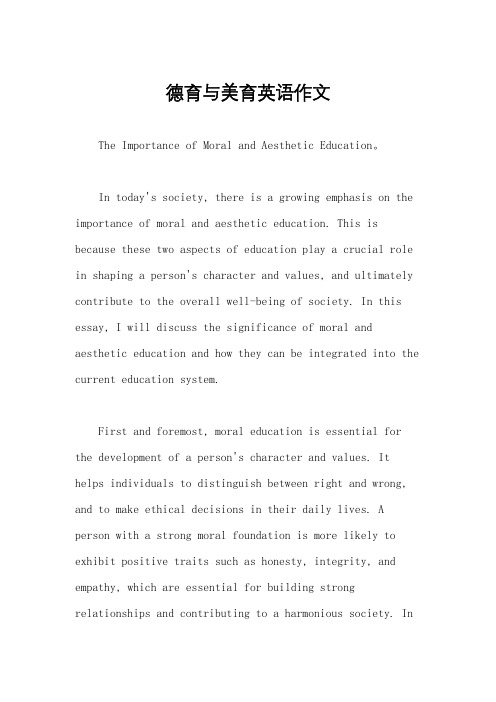
德育与美育英语作文The Importance of Moral and Aesthetic Education。
In today's society, there is a growing emphasis on the importance of moral and aesthetic education. This is because these two aspects of education play a crucial role in shaping a person's character and values, and ultimately contribute to the overall well-being of society. In this essay, I will discuss the significance of moral and aesthetic education and how they can be integrated into the current education system.First and foremost, moral education is essential for the development of a person's character and values. It helps individuals to distinguish between right and wrong, and to make ethical decisions in their daily lives. A person with a strong moral foundation is more likely to exhibit positive traits such as honesty, integrity, and empathy, which are essential for building strong relationships and contributing to a harmonious society. Inaddition, moral education also helps to instill a sense of responsibility and accountability, which are important for personal and social development.Aesthetic education, on the other hand, is importantfor nurturing a person's appreciation for beauty and creativity. It helps individuals to develop an aesthetic sensibility and to recognize and appreciate the value of art, music, literature, and other forms of creative expression. Aesthetic education also encourages individuals to think critically and express themselves creatively, which are important skills for personal and professional success. Furthermore, exposure to the arts and culture can also have a positive impact on a person's emotional and psychological well-being, contributing to a more balanced and fulfilling life.In order to effectively integrate moral and aesthetic education into the current education system, it is important to consider several key factors. Firstly, it is essential to develop a comprehensive curriculum that includes both moral and aesthetic education, and to provideteachers with the necessary training and resources to effectively deliver this curriculum. This may involve incorporating moral and aesthetic education into existing subjects such as history, literature, and the arts, as well as developing new courses and programs specifically focused on these areas.In addition, it is important to create a supportive and nurturing learning environment that encourages students to explore their moral and aesthetic sensibilities, and to express themselves creatively. This may involve providing access to a wide range of cultural and artistic experiences, such as museum visits, theater productions, and music performances, as well as opportunities for students to engage in creative activities such as writing, painting,and music composition.Furthermore, it is important to involve parents and the wider community in the process of moral and aesthetic education, as they play a crucial role in shaping aperson's values and appreciation for the arts. This may involve organizing community events and workshops, as wellas providing resources and support for parents to engage in moral and aesthetic education with their children at home.In conclusion, moral and aesthetic education are essential for the holistic development of individuals and the overall well-being of society. By integrating these two aspects of education into the current education system, we can help to nurture a generation of individuals who are not only academically proficient, but also morally upright and aesthetically sensitive. This will ultimately contribute to a more harmonious and prosperous society for future generations.。
教育家精神的英语作文
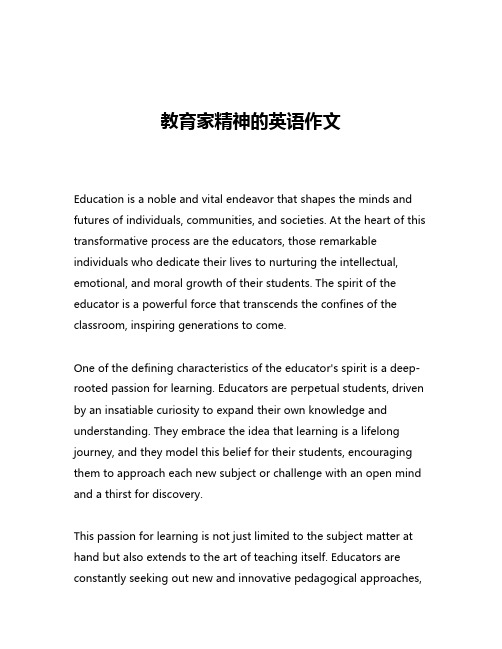
教育家精神的英语作文Education is a noble and vital endeavor that shapes the minds and futures of individuals, communities, and societies. At the heart of this transformative process are the educators, those remarkable individuals who dedicate their lives to nurturing the intellectual, emotional, and moral growth of their students. The spirit of the educator is a powerful force that transcends the confines of the classroom, inspiring generations to come.One of the defining characteristics of the educator's spirit is a deep-rooted passion for learning. Educators are perpetual students, driven by an insatiable curiosity to expand their own knowledge and understanding. They embrace the idea that learning is a lifelong journey, and they model this belief for their students, encouraging them to approach each new subject or challenge with an open mind and a thirst for discovery.This passion for learning is not just limited to the subject matter at hand but also extends to the art of teaching itself. Educators are constantly seeking out new and innovative pedagogical approaches,exploring different teaching methods and strategies to better engage their students and facilitate meaningful learning. They recognize that education is not a one-size-fits-all endeavor, and they are willing to adapt and evolve their teaching practices to suit the diverse needs and learning styles of their students.Another essential aspect of the educator's spirit is a genuine care and concern for the well-being and success of their students. Educators understand that their role extends far beyond the mere transmission of information; they are mentors, guides, and advocates for the young people in their charge. They strive to create a nurturing and supportive learning environment where students feel safe to take risks, express their ideas, and embrace their unique strengths and talents.This deep commitment to student success is often manifested in the form of personalized attention and individualized support. Educators recognize that each student is a unique individual with their own set of challenges, interests, and learning needs. They make the effort to get to know their students on a personal level, to understand their backgrounds, their aspirations, and the obstacles they may be facing. Armed with this knowledge, they are able to tailor their teaching approach to best serve the needs of each student, ensuring that every individual has the opportunity to thrive.At the heart of the educator's spirit is a profound sense of social responsibility and a commitment to using education as a tool for positive change. Educators understand that their work extends far beyond the walls of the classroom, and they strive to empower their students to become engaged and responsible citizens who can contribute to the betterment of their communities and the world at large.This commitment to social justice and equity is reflected in the way educators approach their work. They seek to create learning environments that are inclusive and welcoming to students of all backgrounds, challenging the systemic biases and inequities that have historically excluded marginalized groups from educational opportunities. They also encourage their students to think critically about the world around them, to question the status quo, and to develop the skills and the courage to advocate for positive change.The educator's spirit is also marked by a deep sense of resilience and perseverance. Teaching can be a challenging and demanding profession, fraught with obstacles and setbacks. Yet, the best educators are able to maintain a steadfast commitment to their work, drawing strength and inspiration from the transformative impact they have on the lives of their students.Even in the face of limited resources, institutional barriers, or societalindifference, educators remain undaunted, finding creative ways to overcome challenges and ensure that their students receive the high-quality education they deserve. This resilience is a testament to the profound belief that education is a fundamental human right and a powerful tool for individual and societal empowerment.Finally, the educator's spirit is characterized by a deep sense of humility and a willingness to learn from their students. Educators recognize that the learning process is a two-way street, and they approach their work with a posture of openness and curiosity. They understand that their students bring a wealth of lived experiences, perspectives, and insights that can enrich and inform their own understanding of the world.By embracing this humility, educators create an environment of mutual respect and collaboration, where students feel empowered to share their ideas, to challenge assumptions, and to contribute meaningfully to the learning process. This dynamic exchange of knowledge and perspectives not only benefits the students but also helps to keep the educators themselves intellectually engaged and continuously growing in their craft.In conclusion, the spirit of the educator is a powerful and multifaceted force that has the potential to transform lives, communities, and societies. Through their passion for learning, theirdeep commitment to student success, their unwavering sense of social responsibility, their resilience in the face of adversity, and their humility and openness to learning, educators play a vital role in shaping the future of our world. It is this spirit that we must strive to cultivate and celebrate, for the betterment of all.。
moraleducation英语作文

moraleducation英语作文Moral EducationMoral education is an essential part of a child's development. It helps children learn the difference between right and wrong, and guides them to make ethical decisions in their lives. In today's society, where there is so much exposure to different values and beliefs, it is crucial for children to receive a solid moral education from an early age.There are various ways to provide moral education to children. One of the most effective ways is through storytelling. Stories have the power to teach moral lessons in a way that is engaging and memorable. By reading or listening to stories with moral messages, children can learn important values such as honesty, kindness, and empathy.Another important aspect of moral education is leading by example. Children learn a great deal from observing the behavior of the adults around them. Parents, teachers, and other role models should strive to demonstrate good moralvalues in their actions and words. By doing so, they can set a positive example for children to follow.In addition to storytelling and leading by example, moral education can also be incorporated into the school curriculum. Schools can offer classes or activities that focus on moral development, such as community service projects, discussions on ethical dilemmas, and character-building exercises. By integrating moral education into the academic environment, children can learn to apply moral values in real-life situations.Furthermore, moral education should not be limited to the classroom or home. The media, including television, movies, and the internet, also play a significant role in shaping children's moral values. It is important for parents and educators to monitor and guide children's media consumption, and to discuss the moral implications of what they see and hear.Overall, moral education is crucial for the holistic development of children. By instilling good moral values in children, we can help them become responsible,compassionate, and ethical individuals who contribute positively to society.道德教育道德教育是孩子成长过程中的重要组成部分。
什么是真正的教育英语作文
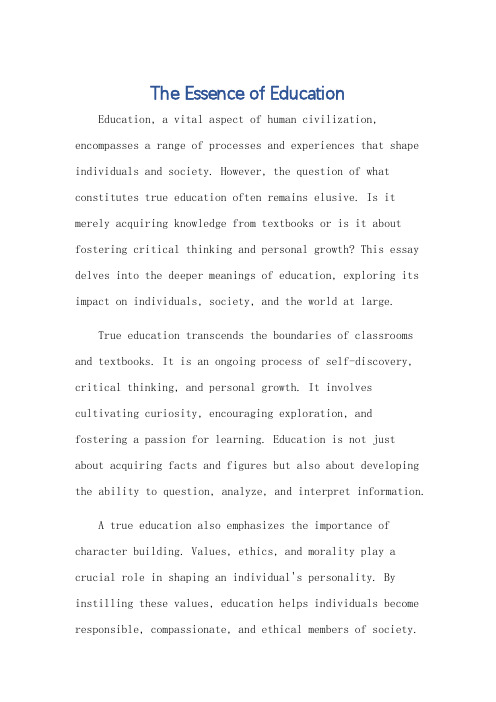
The Essence of EducationEducation, a vital aspect of human civilization, encompasses a range of processes and experiences that shape individuals and society. However, the question of what constitutes true education often remains elusive. Is it merely acquiring knowledge from textbooks or is it about fostering critical thinking and personal growth? This essay delves into the deeper meanings of education, exploring its impact on individuals, society, and the world at large.True education transcends the boundaries of classrooms and textbooks. It is an ongoing process of self-discovery, critical thinking, and personal growth. It involves cultivating curiosity, encouraging exploration, andfostering a passion for learning. Education is not just about acquiring facts and figures but also about developing the ability to question, analyze, and interpret information.A true education also emphasizes the importance of character building. Values, ethics, and morality play a crucial role in shaping an individual's personality. By instilling these values, education helps individuals become responsible, compassionate, and ethical members of society.Moreover, true education is inclusive and respects diversity. It recognizes that every individual has unique talents, abilities, and perspectives. By embracing diversity, education fosters a culture of understanding, tolerance, and respect among students, preparing them to become agents of change in their communities and beyond. Education also has a profound impact on society. A well-educated society is more likely to be innovative, democratic, and prosperous. Education has the power to transform communities, countries, and the world at large. By investing in education, we invest in the future of humanity.In conclusion, true education is an ongoing process of self-discovery, character building, and societal transformation. It goes beyond the confines of classrooms and textbooks, encompassing a range of experiences and perspectives. By fostering curiosity, encouraging exploration, and instilling values, true education equips individuals with the tools and skills they need to thrive in a rapidly changing world.**教育的本质**教育,作为人类文明的重要组成部分,涵盖了塑造个人和社会的各种过程和经验。
德育教育是什么英文作文
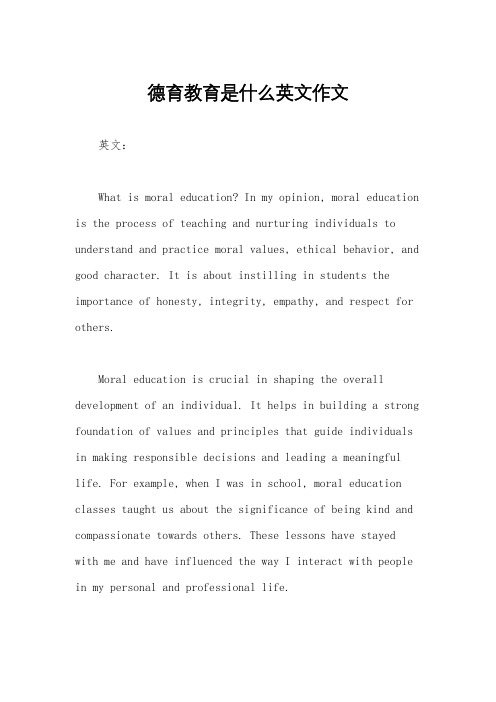
德育教育是什么英文作文英文:What is moral education? In my opinion, moral education is the process of teaching and nurturing individuals to understand and practice moral values, ethical behavior, and good character. It is about instilling in students the importance of honesty, integrity, empathy, and respect for others.Moral education is crucial in shaping the overall development of an individual. It helps in building a strong foundation of values and principles that guide individuals in making responsible decisions and leading a meaningful life. For example, when I was in school, moral education classes taught us about the significance of being kind and compassionate towards others. These lessons have stayed with me and have influenced the way I interact with people in my personal and professional life.Moreover, moral education also plays a significant role in promoting a harmonious and inclusive society. It encourages individuals to embrace diversity, show understanding towards different perspectives, and work towards the common good. For instance, through moral education, students learn about the importance ofinclusivity and acceptance, which helps in creating a more tolerant and respectful community.中文:德育教育是什么?在我看来,德育教育是教育和培养个体理解和实践道德价值观、道德行为和良好品德的过程。
有关教育均等的作文英语
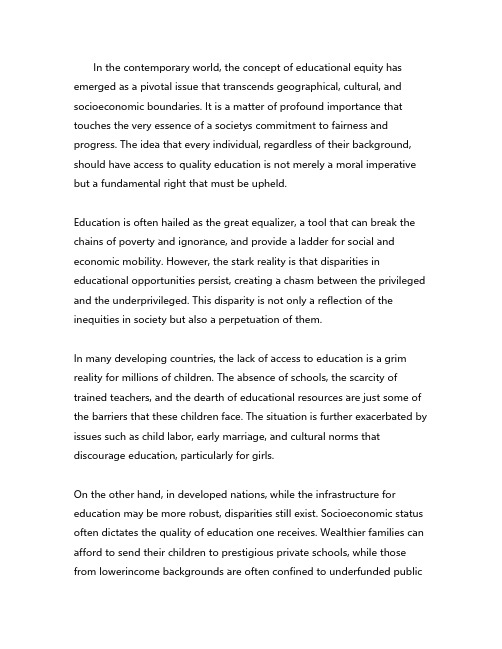
In the contemporary world, the concept of educational equity has emerged as a pivotal issue that transcends geographical, cultural, and socioeconomic boundaries. It is a matter of profound importance that touches the very essence of a societys commitment to fairness and progress. The idea that every individual, regardless of their background, should have access to quality education is not merely a moral imperative but a fundamental right that must be upheld.Education is often hailed as the great equalizer, a tool that can break the chains of poverty and ignorance, and provide a ladder for social and economic mobility. However, the stark reality is that disparities in educational opportunities persist, creating a chasm between the privileged and the underprivileged. This disparity is not only a reflection of the inequities in society but also a perpetuation of them.In many developing countries, the lack of access to education is a grim reality for millions of children. The absence of schools, the scarcity of trained teachers, and the dearth of educational resources are just some of the barriers that these children face. The situation is further exacerbated by issues such as child labor, early marriage, and cultural norms that discourage education, particularly for girls.On the other hand, in developed nations, while the infrastructure for education may be more robust, disparities still exist. Socioeconomic status often dictates the quality of education one receives. Wealthier families can afford to send their children to prestigious private schools, while those from lowerincome backgrounds are often confined to underfunded publicschools with overcrowded classrooms and limited resources.The impact of educational inequity is farreaching and multifaceted. It not only limits the potential of individuals but also hampers the overall development of a nation. A society that fails to educate its citizens is a society that is not investing in its future. The lack of education can lead to a host of social issues, including unemployment, poverty, and crime, which can further widen the gap between the rich and the poor.To address the issue of educational equity, it is essential to adopt a multipronged approach. Firstly, governments must prioritize education and allocate sufficient resources to ensure that every child has access to quality education. This includes investing in infrastructure, hiring qualified teachers, and providing necessary educational materials.Secondly, policies must be implemented to eliminate discrimination and bias in the education system. This could involve affirmative action programs, scholarships for underprivileged students, and initiatives to promote gender equality in education.Moreover, the role of nongovernmental organizations and the private sector cannot be underestimated. They can play a crucial role in supplementing government efforts, providing resources, and advocating for educational equity.One inspiring example of such an initiative is the work of the Malala Fund, which was established by the youngest Nobel laureate, Malala Yousafzai.The fund aims to provide education to girls in Pakistan and other countries where they are denied this basic right. Through their efforts, thousands of girls have been able to attend school and pursue their dreams.In conclusion, educational equity is not just a moral imperative but a necessary condition for a just and prosperous society. It is a collective responsibility that requires the concerted efforts of governments, educational institutions, communities, and individuals. By working together, we can ensure that every child, regardless of their circumstances, has the opportunity to learn, grow, and contribute to the world. The future of our society hinges on our ability to provide equal opportunities for all, and it is a challenge that we must rise to meet.。
弘扬教育家精神,勇担新时代使命英语作文
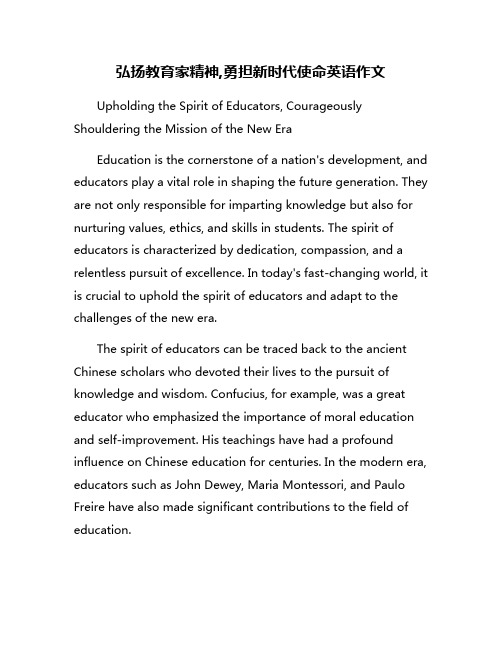
弘扬教育家精神,勇担新时代使命英语作文Upholding the Spirit of Educators, Courageously Shouldering the Mission of the New EraEducation is the cornerstone of a nation's development, and educators play a vital role in shaping the future generation. They are not only responsible for imparting knowledge but also for nurturing values, ethics, and skills in students. The spirit of educators is characterized by dedication, compassion, and a relentless pursuit of excellence. In today's fast-changing world, it is crucial to uphold the spirit of educators and adapt to the challenges of the new era.The spirit of educators can be traced back to the ancient Chinese scholars who devoted their lives to the pursuit of knowledge and wisdom. Confucius, for example, was a great educator who emphasized the importance of moral education and self-improvement. His teachings have had a profound influence on Chinese education for centuries. In the modern era, educators such as John Dewey, Maria Montessori, and Paulo Freire have also made significant contributions to the field of education.To uphold the spirit of educators, we must first recognize the importance of education in shaping the future of society. Education is not just about acquiring knowledge but also about developing critical thinking, creativity, and empathy. Educators must be role models for students, inspiring them to learn, explore, and grow. They should instill in students a love for learning and a sense of curiosity about the world.In the face of the challenges posed by the new era, educators must be prepared to adapt and innovate. The rapid advancement of technology has transformed the way we learn and communicate. Educators must be open to new ideas and technologies, integrating them into their teaching methods to enhance the learning experience for students. They must also be proactive in addressing issues such as inequality, discrimination, and environmental degradation, guiding students to become responsible global citizens.Courageously shouldering the mission of the new era requires educators to be proactive and visionary. They must be willing to challenge the status quo, advocate for change, and lead by example. In a rapidly changing world, educators must be lifelong learners, constantly seeking new knowledge and skills to stay relevant and effective. They must also collaborate with otherstakeholders, including parents, policymakers, and community members, to create a supportive and inclusive learning environment for students.In conclusion, the spirit of educators is a timeless and universal principle that guides us in the pursuit of knowledge and wisdom. By upholding this spirit and courageously shouldering the mission of the new era, educators can inspire future generations to strive for excellence and make a positive impact on society. Let us all work together to build a brighter future for our children and future generations.。
moral education英语作文
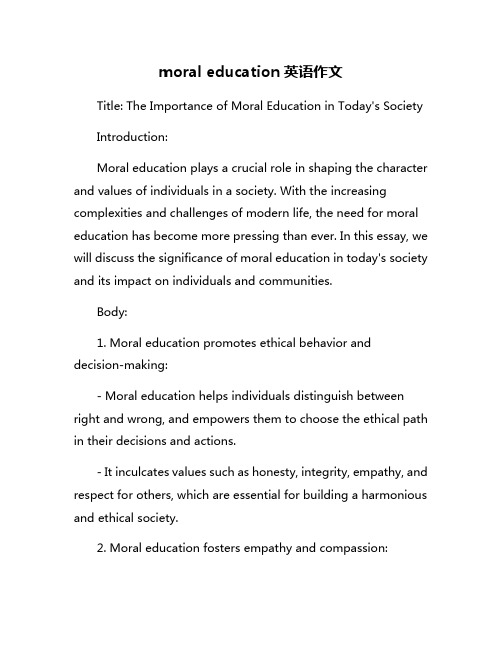
moral education英语作文Title: The Importance of Moral Education in Today's SocietyIntroduction:Moral education plays a crucial role in shaping the character and values of individuals in a society. With the increasing complexities and challenges of modern life, the need for moral education has become more pressing than ever. In this essay, we will discuss the significance of moral education in today's society and its impact on individuals and communities.Body:1. Moral education promotes ethical behavior and decision-making:- Moral education helps individuals distinguish between right and wrong, and empowers them to choose the ethical path in their decisions and actions.- It inculcates values such as honesty, integrity, empathy, and respect for others, which are essential for building a harmonious and ethical society.2. Moral education fosters empathy and compassion:- By teaching individuals to understand and empathize with the feelings and perspectives of others, moral education promotes kindness, compassion, and tolerance towards people from diverse backgrounds and beliefs.- These qualities are crucial for fostering understanding, acceptance, and cooperation in a diverse and interconnected world.3. Moral education enhances personal development and well-being:- Moral education contributes to the holistic development of individuals by nurturing their moral, social, emotional, and cognitive skills.- It promotes self-awareness, self-regulation, and emotional intelligence, which are essential for building resilience, coping with stress, and fostering mental well-being.4. Moral education strengthens social cohesion and community resilience:- By instilling moral values and principles, moral education promotes social cohesion, mutual trust, and cooperation among individuals and communities.- It helps to build strong and resilient communities that are united by shared values, beliefs, and civic responsibilities.Conclusion:In conclusion, moral education is essential for nurturing individuals with strong character, integrity, and empathy, who can contribute positively to their communities and society. In today's rapidly changing and complex world, the need for moral education is more pressing than ever. By promoting ethical behavior, empathy, compassion, personal development, and social cohesion, moral education plays a vital role in shaping a more just, inclusive, and sustainable society. As educators, parents, and policymakers, we must prioritize and invest in moral education to ensure the well-being and prosperity of future generations.。
moral education雅思大作文

moral education雅思大作文Moral education is a crucial aspect of a child's development, as it shapestheir values, beliefs, and behavior. In today's society, the importance of moral education is often overshadowed by the emphasis on academic achievement and career success. However, the lack of moral education can lead to negative consequences, such as unethical behavior, lack of empathy, and a disregard for the well-being of others. In this essay, I will explore the significance of moral education and its impact on individuals and society as a whole.From a psychological perspective, moral education plays a vital role inshaping a child's personality and character. It helps them develop a strong sense of right and wrong, empathy, and compassion for others. Without moral education, children may grow up with a lack of moral compass, leading to selfish andunethical behavior. This can have far-reaching consequences, not only for the individual but also for the society as a whole. Therefore, it is essential to prioritize moral education in the upbringing of children.Moreover, from a societal perspective, moral education is crucial for maintaining a harmonious and ethical community. When individuals are taught to value honesty, integrity, and respect for others, it creates a more cohesive and compassionate society. On the contrary, a lack of moral education can lead to a society rife with corruption, crime, and social unrest. Therefore, the promotionof moral education is not only beneficial for individuals but also for the greater good of society.Furthermore, from an educational perspective, moral education can complement academic learning and contribute to the holistic development of students. While academic knowledge is important for career success, moral education equipsstudents with the necessary values and ethics to navigate through life withintegrity and compassion. It also fosters a sense of responsibility towards the community and encourages students to become active and ethical citizens. Therefore,schools should integrate moral education into their curriculum to ensure that students receive a well-rounded education.On the other hand, some may argue that moral education is the responsibility of parents and should not be imposed by educational institutions. While it is true that parents play a crucial role in instilling moral values in their children, it is also essential for schools to reinforce these values. Children spend a significant amount of time in school, and it is the perfect environment to impart moral education through various activities, discussions, and role-playing exercises. Therefore, both parents and educational institutions should work together to provide a comprehensive moral education to children.In conclusion, moral education is an integral part of a child's development, with far-reaching implications for individuals and society. It is essential for shaping a child's character, fostering a harmonious society, and complementing academic learning. Therefore, it is imperative for parents and educational institutions to prioritize moral education and ensure that children grow up with a strong moral compass. By doing so, we can create a more compassionate, ethical, and harmonious society for future generations.。
关于五育理念的作文
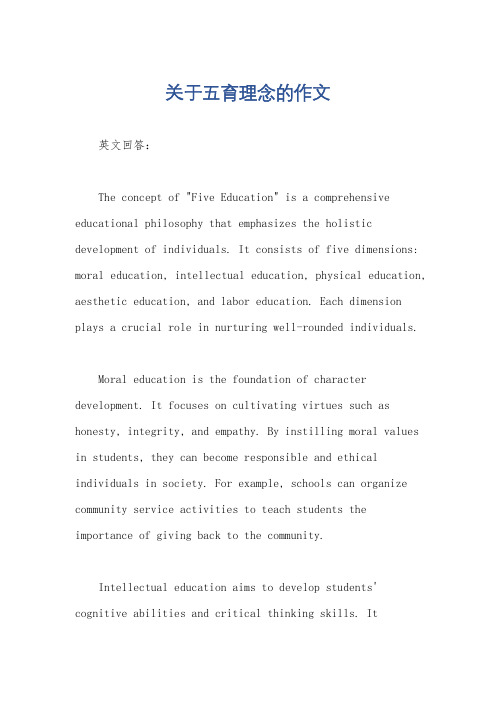
关于五育理念的作文英文回答:The concept of "Five Education" is a comprehensive educational philosophy that emphasizes the holistic development of individuals. It consists of five dimensions: moral education, intellectual education, physical education, aesthetic education, and labor education. Each dimension plays a crucial role in nurturing well-rounded individuals.Moral education is the foundation of character development. It focuses on cultivating virtues such as honesty, integrity, and empathy. By instilling moral values in students, they can become responsible and ethical individuals in society. For example, schools can organize community service activities to teach students the importance of giving back to the community.Intellectual education aims to develop students' cognitive abilities and critical thinking skills. Itinvolves providing a stimulating learning environment and encouraging students to explore new ideas and knowledge.For instance, teachers can use interactive teaching methods to engage students in discussions and debates, fostering their analytical and problem-solving skills.Physical education promotes students' physical well-being and instills a healthy lifestyle. It includesactivities such as sports, exercise, and outdoor adventures. By participating in physical activities, students can improve their physical fitness, develop teamwork skills,and enhance their mental resilience. For instance, schools can organize inter-school sports competitions to promote healthy competition and sportsmanship among students.Aesthetic education focuses on nurturing students' appreciation for the arts and beauty. It involves exposing students to various art forms such as music, painting, and literature. By appreciating the arts, students can develop their creativity, imagination, and aesthetic sensibility. For example, schools can organize art exhibitions or music concerts to showcase students' artistic talents and inspiretheir artistic pursuits.Labor education emphasizes the importance of practical skills and work ethics. It involves teaching students practical skills such as cooking, gardening, and craftsmanship. By engaging in hands-on activities, students can develop a strong work ethic, learn the value of hard work, and gain practical skills that can be applied intheir future careers. For instance, schools can organize workshops or internships to provide students with opportunities to learn practical skills and gain real-world work experience.中文回答:“五育理念”是一种综合性的教育理念,强调个体的全面发展。
- 1、下载文档前请自行甄别文档内容的完整性,平台不提供额外的编辑、内容补充、找答案等附加服务。
- 2、"仅部分预览"的文档,不可在线预览部分如存在完整性等问题,可反馈申请退款(可完整预览的文档不适用该条件!)。
- 3、如文档侵犯您的权益,请联系客服反馈,我们会尽快为您处理(人工客服工作时间:9:00-18:30)。
Education and morality-英语作文写作范文
In modern society, the decline in morals is becoming more and more severe. For example, there have been a few cases in which a senior woman pretended to have fallen over and then blackmailed the person who tried to help her. There was also another case where a little girl was hit by a car and no passers-by gave her a hand.
To solve this problem, we need first to find out the reasons. For one, the fast pace of modern society is driving people apart from each other, thus people are losing the patience to care for others. For another, with technology developing, it’s much easier for people to know what is happening in the world today. In order to draw people’s attention, some media would lay stress on negative news and overemphasize the negative effects.
To reestablish social morals, we must work together. People should learn to care for the others, while the media should treat negative news more properly.
在现代社会中,道德的下降正变得越来越严重。
例如,有一些案例中,一个高级女假装摔倒然后勒索的人试图协助她。
还有一种情况是,一个小女孩被一辆车撞了,没有一个路人给她一只手。
要解决这个问题,首先要找出原因。
对于一个,现代社会的快节奏,使人们彼此分离,所以人们失去了耐心去照顾别人。
另一方面,随着科技的发展,人们更容易了解当今世界发生了什么。
为了吸引人们的注意,一些媒体会注重和强调负面新闻的负面影响。
重建社会道德,我们必须一起工作。
人们应该学会照顾别人,而媒体应该更恰当地对待负面新闻。
